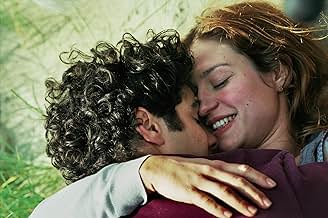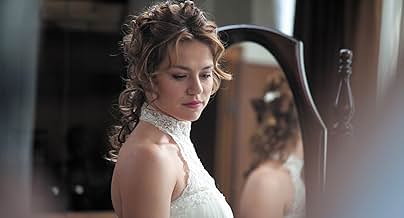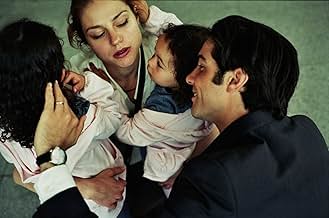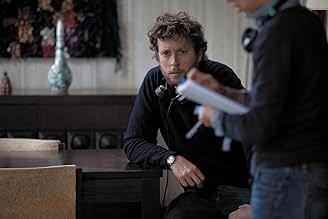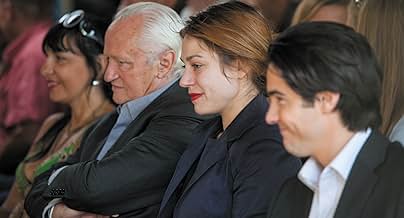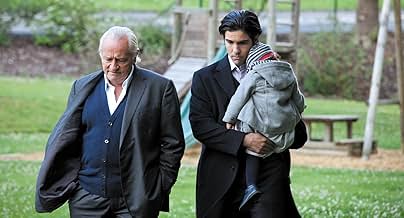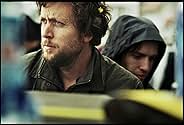IMDb RATING
6.8/10
3.2K
YOUR RATING
Happy couple, will marry and have children under the roof of the benevolent Doctor. Little by little, relationships become complex, suffocating the couple and the family, who are unaware of ... Read allHappy couple, will marry and have children under the roof of the benevolent Doctor. Little by little, relationships become complex, suffocating the couple and the family, who are unaware of the tragic end towards which they are headingHappy couple, will marry and have children under the roof of the benevolent Doctor. Little by little, relationships become complex, suffocating the couple and the family, who are unaware of the tragic end towards which they are heading
- Director
- Writers
- Stars
- Awards
- 9 wins & 12 nominations total
- Director
- Writers
- All cast & crew
- Production, box office & more at IMDbPro
Featured reviews
In 'Our Children' - based on the tragic real events of Brussels mother, Geneviève Lhermitte, who, in 2007, killed her five children - writer-director Joachim Lafosse skillfully shows how a comfortable domestic environment gradually becomes a prison for a woman and subtly suggests the reasons why she might be driven to commit her hideous crime. So raw it's almost unbearable. But the movie really belongs to Emilie Dequenne. Her portrayal of a character's descent from free spirit to crushed soul is spellbinding and makes this tragedy all the more heartbreaking.
Few artists can do what Mister Arestrup does.A character actor in the noblest sense of the word,he never gives you the impression he overplays ;yet,he can be frightening ,makes you blood run cold ,while remaining extremely restraint.In the five last years ,his two portrayals (the wine-grower in "Tu Seras Mon Fils " ,and the stepfather in "A Perdre La Raison") are among the most impressive in the contemporary French cinema.
A Young couple (she is a French Teacher,he is a Morrocan immigrant)sees their life ,slowly but inexorably ,elude them.The Young man's stepfather he calls his Godfather provides them with everything a Young couple may wish :no problem to make ends meet .But the lack of intimacy becomes hard to bear for the Young woman who would like to share a true home with her husband.But the wealthy man does not want his protégés to run away and he 's using financial blackmail as well as emotional blackmail.They are under "tutelage" :the Young man ,who seems immature sees his protector as a merciful God but his wife is not prepared to accept it.This house is not big enough for the three of us.
It's putting off the inevitable;the last scene ,showing the house of "happiness" ,filmed in fixed camera shot ,could not have been more harrowing.
A Young couple (she is a French Teacher,he is a Morrocan immigrant)sees their life ,slowly but inexorably ,elude them.The Young man's stepfather he calls his Godfather provides them with everything a Young couple may wish :no problem to make ends meet .But the lack of intimacy becomes hard to bear for the Young woman who would like to share a true home with her husband.But the wealthy man does not want his protégés to run away and he 's using financial blackmail as well as emotional blackmail.They are under "tutelage" :the Young man ,who seems immature sees his protector as a merciful God but his wife is not prepared to accept it.This house is not big enough for the three of us.
It's putting off the inevitable;the last scene ,showing the house of "happiness" ,filmed in fixed camera shot ,could not have been more harrowing.
I am not a professional reviewer nor a movie expert. I have been struck by this movie since I recognize a lot in my personal life. My wife suffers from a bipolar disorder, and it took us 10 years to understand what she has before we could start proper treatment. This movie shows in a subtle and nuanced way, without judging, the systemic and destructive effects of this dreadful illness.
I am fascinated by the way Joachim Lafosse, already at the age of 37, has been able to show the transformation of the relationship and behavior of the two other main characters, the partner and doctor. Many reviews suggest a perpetrator-victim relationship, for me Lafosse effectively showed that the whole family is a victim of this illness. In French "Tout comprendre c' est tout pardonner"; when you understand, you forgive. Very, very well done and the mother brilliantly played by Emilie Dequenne.
This is a must see for everybody who knows somebody with a mental illness.
I am fascinated by the way Joachim Lafosse, already at the age of 37, has been able to show the transformation of the relationship and behavior of the two other main characters, the partner and doctor. Many reviews suggest a perpetrator-victim relationship, for me Lafosse effectively showed that the whole family is a victim of this illness. In French "Tout comprendre c' est tout pardonner"; when you understand, you forgive. Very, very well done and the mother brilliantly played by Emilie Dequenne.
This is a must see for everybody who knows somebody with a mental illness.
A KVIFF screening, from French director Joachim Lafosse, before now the film has won a BEST ACTRESS award (for Émilie Dequenne) in UN CERTAIN REGARD competition in this year's Cannes.
It is an unsettling drama concerns a tragedy which would be quite a mind-shocker. The film begins with the wife lying in the hospital bed (clearly after some severe accident) and mumbling that her children should be buried in Morocco, so during the subsequent truth-revealing narrative, viewers are practically preparing ourselves to undertake a tremendous calamity (my speculation is a car accident), but the film will deliver a much stronger and crueler blow, the actual long-takes of the massacre are done in an eerily tranquil restraint (considerably withdrawn from the actual execution).
The foci are on the bizarre triangular relationship among three people, Mounir, a young Moroccan man and his French wife Murielle, live with elderly André a rich French doctor who had a paper marriage arrangement with Mounir's mother, so he could bring Mounir with him, and provide a job for him to work in his private clinic. So technically Mounir-André's quasi father- son bond has a deeper root (than Murielle, the clear intruder could imagine) although they are no blood linkage. Later, when their children consequently arriving in this world, step-by-step Murielle finds herself suffocated by the temporal life (possibly postpartum depression), and eagerly sways Mounir to go back to Morocco with their family, to start their life anew. But thing is slipping to an abyss when André cannot risk losing them and Mounir relies too much on him (both economically and psychologically) as well. Until the confrontation between Murielle and André finally occurs, the tragedy is inescapable.
A heavy string score is predestined to the solemn tenor, the film is a trifle long-haul (a 111 minute running time) and the transitions of the characters' mental activities are either too abrupt or too hackneyed, but Émilie Dequenne for sure has been splendidly extraordinary in her devastating role, her self-destroy interpretation is powerful enough to propel the story against its ill-fated destiny. The A PROPHET (2009, a 9/10) pair, Tahar Rahim and Niels Arestrup are sharing their leading status as the other two angles of the triangle hazard, and overtly the latter has a meatier presence.
There is a chafed undertone against the main plot, which I dare not to sidestep, the legality of paper marriage may not be the crux behind the tragedy, but nevertheless plays an influential part of the contemporary immigrant quandary.
It is an unsettling drama concerns a tragedy which would be quite a mind-shocker. The film begins with the wife lying in the hospital bed (clearly after some severe accident) and mumbling that her children should be buried in Morocco, so during the subsequent truth-revealing narrative, viewers are practically preparing ourselves to undertake a tremendous calamity (my speculation is a car accident), but the film will deliver a much stronger and crueler blow, the actual long-takes of the massacre are done in an eerily tranquil restraint (considerably withdrawn from the actual execution).
The foci are on the bizarre triangular relationship among three people, Mounir, a young Moroccan man and his French wife Murielle, live with elderly André a rich French doctor who had a paper marriage arrangement with Mounir's mother, so he could bring Mounir with him, and provide a job for him to work in his private clinic. So technically Mounir-André's quasi father- son bond has a deeper root (than Murielle, the clear intruder could imagine) although they are no blood linkage. Later, when their children consequently arriving in this world, step-by-step Murielle finds herself suffocated by the temporal life (possibly postpartum depression), and eagerly sways Mounir to go back to Morocco with their family, to start their life anew. But thing is slipping to an abyss when André cannot risk losing them and Mounir relies too much on him (both economically and psychologically) as well. Until the confrontation between Murielle and André finally occurs, the tragedy is inescapable.
A heavy string score is predestined to the solemn tenor, the film is a trifle long-haul (a 111 minute running time) and the transitions of the characters' mental activities are either too abrupt or too hackneyed, but Émilie Dequenne for sure has been splendidly extraordinary in her devastating role, her self-destroy interpretation is powerful enough to propel the story against its ill-fated destiny. The A PROPHET (2009, a 9/10) pair, Tahar Rahim and Niels Arestrup are sharing their leading status as the other two angles of the triangle hazard, and overtly the latter has a meatier presence.
There is a chafed undertone against the main plot, which I dare not to sidestep, the legality of paper marriage may not be the crux behind the tragedy, but nevertheless plays an influential part of the contemporary immigrant quandary.
A Perdre La Raison starts badly because within the first moments, Joachim Lafosse chose to reveal the final outcome: 4 little coffins, what's more white, one quickly can connect the dots which completely annihilates the element of surprise and ruins part of the interest of the movie, which anyway remains minimal.
Indeed, we're dealing with a superficial script, that raises a lot of questions but only offers a few answers which is very frustrating. One has trouble grasping the stakes and understanding the motivations because under the guise of suggesting, the movie never gets deeper on anything. The plot is very, very limited the dramatic resources are almost nonexistent and the lack of dialogues is as heavy as the atmosphere prevailing within this distinctive family, to say the least.
The character of André, quite intriguing and very well embodied by the ageless Niels Arestrup, is the only thing to remember.
Indeed, we're dealing with a superficial script, that raises a lot of questions but only offers a few answers which is very frustrating. One has trouble grasping the stakes and understanding the motivations because under the guise of suggesting, the movie never gets deeper on anything. The plot is very, very limited the dramatic resources are almost nonexistent and the lack of dialogues is as heavy as the atmosphere prevailing within this distinctive family, to say the least.
The character of André, quite intriguing and very well embodied by the ageless Niels Arestrup, is the only thing to remember.
Did you know
- TriviaThe official entry of Belgium to the Best Foreign Language Film at the 85th Academy Awards 2013.
- ConnectionsReferences Rocky III (1982)
- How long is Our Children?Powered by Alexa
Details
- Release date
- Countries of origin
- Official sites
- Languages
- Also known as
- Perder la razón
- Filming locations
- Dudelange, Luxembourg(town hall for the wedding ceremony)
- Production companies
- See more company credits at IMDbPro
Box office
- Gross US & Canada
- $23,203
- Opening weekend US & Canada
- $5,500
- Aug 4, 2013
- Gross worldwide
- $700,215
- Runtime1 hour 51 minutes
- Color
- Sound mix
- Aspect ratio
- 2.35 : 1
Contribute to this page
Suggest an edit or add missing content




